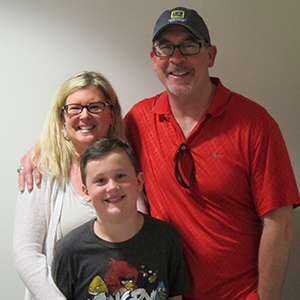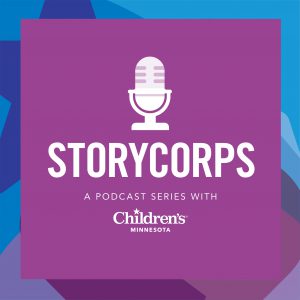Hemophilia: Theresa, Joe and Zach’s story


About this episode
Theresa’s father died of hemophilia and she discusses what it is like to be raising a son with hemophilia. Her family history greatly impacts the way she cares for her son Zach. Zach and Theresa have a strong bond, that is strengthened by Zach’s hemophilia diagnosis.
Topics:
- Normalcy
- Self infusion; challenges
- School experience
- Parent child bond
Transcript
Zach: Yes. So hemophilia, I don’t really think it’s that hard, because the sports that I like to play I can play, like baseball and swimming, but like hockey and football the sports that I probably shouldn’t play, I don’t really have an interest in them anyway. I think when I was younger it used to be a little hard, because I didn’t like the infusion in my arm.
Theresa: I remember when he was a toddler. I would always be afraid you would bump your head on the table, or you’d get those big bruises that would look like they had marbles in them. Remember those?
Joe: I remember picking you up from school and you hiding the fact that you were hurt, because you didn’t want to come in and have a needle in you.
Zach: We used laughing gas, and it worked really good. I didn’t even know that they were doing the infusion in my arm.
Joe: That was great.
Zach: There’s this numbing cream called EMLA, and I put it on my vein, on the outside then we put a bandage over it.
Theresa: What is the EMLA supposed to do?
Zach: It numbs that part of the arm, so when the needle goes in you can barely feel it. I think that’s helped a lot. Without that it probably would have been harder.
Theresa: Right. So why do we come in once a week to do this? Do you remember why?
Zach: To prevent from getting bleeds, so the factor helps if I get hurt.
Theresa: What happens when you get a bleed? Maybe you can talk about that, like how it feels on the inside.
Zach: When I get a bleed in one of my joints like in my leg, in my leg is probably one of the worst ones, because I have to use crutches. Basically when you step it has a bunch of pressure on that spot.
Theresa: Does it feel tight?
Zach: Yes kind of.
Theresa: Does it hurt?
Zach: Yes.
Theresa: Does it feel like there’s something inside of it?
Zach: It just feels like something pushing down on it. If I get the factor before a bleed I don’t really get a lot of bleeds so it kind of prevents it.
Joe: When you go in once a week, how long does it take for the infusion, the actual, when the needle goes in?
Zach: It depends because some people they talk to my mom about stuff about things, and it takes a little bit.
Theresa: We visit.
Joe: Shopping and…
Zach: One of the nurses, she talks to my mom while she’s doing it, so it goes really fast.
Theresa: Who’s that nurse? She just gets down to business doesn’t she, which we like that.
Zach: It’s usually about fifteen minutes.
Theresa: Do you think your hemophilia will prevent you from doing anything?
Zach: No. Probably not.
Theresa: No. So it’s like you said, you can still swim and play baseball and do waterparks and have fun, right?
Zach: Yes.
Theresa: What’s the hardest part about having hemophilia do you think?
Zach: It’s not really that hard, but I think like going to the doctor every day is a little bit…
Theresa: Do you mean every week?
Zach: Yes every week.
Theresa: Then of course they are always trying to convince us to do the pokes at home. What do you think about doing that?
Zach: I don’t really want to do it, but I wouldn’t care if you guys did.
Theresa: Well, I think that I’d be afraid that I would hurt you, and that would be the hardest part for me. My hand would probably shake. So, do you think we will be able to learn before we go on vacation like Linda [nurse] says or no?
Joe: When we are on vacation in small towns sometimes we have a funny look from doctors when we walk in. They are not too sure sometimes.
Theresa: They are like, “Oh I better call someone before I do it.” Then you come here and Nicole [nurse], she can carry on a conversation plus do it in like three minutes, and you don’t even know it’s done. So, is there anything good about having hemophilia?
Zach: Yes. I like the Bunker Beach and the Nickelodeon Universe thing.
Theresa: What are those events for?
Zach: For people with hemophilia, so it’s kind of nice to go to those.
Theresa: Why do they do that? Do you know why? Why do you think they do it?
Zach: Because it’s hard for the people with hemophilia, and then they do something fun for them.
Theresa: Yes and it’s fun things that kids with hemophilia can do, like going on a waterslide.
Zach: Like swimming or just going on a roller coaster.
Theresa: Remember when they came to your class and what did they do?
Zach: They brought this little dummy, and they showed how they would do the infusion with a needle and they told all my classmates what hemophilia is and things like that.
Theresa: What did your classmates used to think was wrong with you before they learned that you had hemophilia?
Zach: They just thought that I got a lot of broken bones.
Theresa: Some mom called me one day and thought he had brittle bone disease. She goes, “Is that what Zach has?” I’m like, “No, he just has hemophilia.” Her daughter had come home and said, “He broke his leg again, and then last week he broke his arm.” When you wear those slings or when you’re on crutches nobody understands. Do you think it helped them to understand what you have?
Zach: Yes kind of.
Theresa: Does anyone treat you differently because you have hemophilia?
Zach: No not really.
Theresa: Do you have any questions you want to ask dad or me?
Zach: Was it hard helping me grow up with hemophilia?
Joe: No, not at all.
Theresa: I remember when they had to put the needle in you and you were scared. That of course was hard for me. I think a lot of kids like the countdown….
Joe: That was tough…
Theresa: …and we don’t…
Joe: That was the hardest part that whole period of time right before the laughing gas.
Theresa: The one thing that makes me feel better is it’s nothing that you’ll die from. That’s the one thing that just makes me feel it’s just kind of something that you will have to deal with- if we make it a part of your life. If we need to take medicine for something or if we need to do something we just do it, and then we try and just live our lives.
Zach: No it will probably be easy, because when I get older I’m not going to do crazy stuff. I just think right now it’s a good time because I can be active and still trip…
Theresa: So now you’re eleven, you’ve been getting treated for ten years.Alright one final word to a kid who might have hemophilia, what do you want to say?
Zach: I don’t know. It’s kind of hard at the beginning, but once you have it for a little bit, like once you get older it’s not really that hard anymore.
Jocelyn: What do you think is a strength of your family? What gives you guys strength?
Theresa: I think we like to laugh, that is a big part of our life.
Joe: We’re pretty tight. We all like each other. We like to have fun.
Theresa: Now for us at this age we are trying to do the preventative every week, it’s just become part of our routine. even if he ever got a really bad bleed we know that they would give him the right amount of factor and he would heal and that it [would] be okay. So that makes me feel reassured. The people that work here are just so awesome and so nice!
Joe: He’s the guy going through everything, but to watch him coming out of school picking him up and I knew he was hiding it [a bleed] and I felt so bad for him mentally as well as physically.
Theresa: [Laughing] You’re our favorite. No Zach, you know how much I love you and how I always tell you how tough and strong you are. I’m just really proud of you and how you handle all this, because a lot of kids would just be sad or whiny or just getting mad, which would be okay because it’s tough. But you’re very sweet and you know and you’re my boodoo and I love you. You’re my tough baby!
Joe: I know that Zach is going to look back on this someday and realize how tough he is. What you’ve done so far is really amazing!
We wish to extend our thanks to the families who have shared their story here about the impact of living with hemophilia and sickle cell disease. We would also like to thank the many who worked on this project:
The Children’s Minnesota StoryCorps Legacy Team:
Eddie Gonzalez, Jocelyn Bessette Gorlin, Susan Kearney, Stephen Nelson, Margaret Heisel-Kurth, Stephanie Davis, Angela Blue, Elizabeth McDonough, Jill Swenson and Alisa Linne.
Special thanks to:
Stephanie Moua, Hamdi Hussein, Sadia Farah, Fatima Ali, Caillyn Costello, Suzanne Lehman, Suzan Ulrich, D'Ann Urbaniak Lesch, Justin Nelson, Allison Albright, Marvin Holmes-Leopold, Jose Rodriguez and Mitch Hare.
Minneapolis Institute for Production and Recording:
Jose Rodriguez and Mitch Hare.